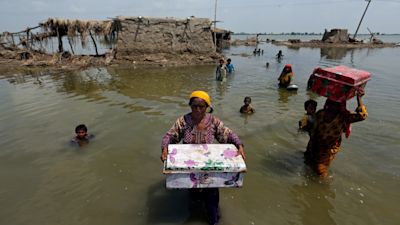COP27: World leaders start to gather in Egypt as key UN climate summit begins

ITV News' Peter Smith reports on the significance of this year's climate change summit
Alok Sharma used his opening speech at the start of COP27 to warn of "climate catastrophe" if sufficient action to limit global temperatures is not taken, as world leaders started to gather for international climate change talks.
Mr Sharma on Sunday handed over the presidency of the UN's COP26 climate summit programme to his counterpart at the start of the COP27 meeting in the Red Sea resort of Sharm el-Sheikh, Egypt.
It came as the UN’s weather and climate body released its annual state of the global climate report with yet another warning that the target to limit temperature rises to 1.5C was “barely within reach”.
Countries agreed under the Paris climate treaty in 2015 to try and limit it to 1.5C above pre-industrial levels to avoid the worst impacts of climate change, but there has not been enough action to meet this target.
'This is about trying to create loss and damage reparations for those who have been least responsible'
"Friends, we are not currently on a pathway that keeps 1.5 in reach," Mr Sharma told delegates gathered in Egypt.
"And whilst I do understand that leaders around the world have faced competing priorities this year, we must be clear, as challenging as our current moment is, inaction is myopic, and can only defer climate catastrophe.
"We must find the ability to focus on more than one thing at once."
"How many more wake-up calls do world leaders actually need?" he added, before listing a series of extreme weather events linked to climate change this year, including the Pakistan floods which submerged a third of the country underwater.
Mr Sharma said COP27 - which will see around 120 world leaders and 30,000 people attend the two-week summit - has to be about "concrete action" if climate crisis is to be avoided.
"The cascading risks are also clear," he said, as a new report, by the UN’s World Meteorological Organization, found that the past eight years were the eight hottest ever recorded.
"Entire economic sectors becoming unsustainable and uninsurable, entire regions becoming unliveable, and the strain on the global movement of goods, and the pressure on people to relocate because of the climate crisis, becoming almost unimaginable.
"So, this conference must be about concrete action."
One of the central issues at COP27 is that action is needed to cut fossil fuels and the greenhouse gases driving climate change, as we are currently on course for 2.4-2.6C of warming – which the UN warns would be catastrophic.
Developed countries are also under pressure to deliver the levels of finance promised – and needed – to help poorer nations adapt to climate change and to invest in clean technology.
Delegates at the summit have already agreed to discuss whether rich nations should compensate poor countries most vulnerable to climate change for their suffering.
"This creates for the first time an institutionally stable space on the formal agenda of COP and the Paris Agreement to discuss the pressing issue of funding arrangements needed to deal with existing gaps, responding to loss and damage," COP27 president Sameh Shoukry said.
High-income nations blocked a proposal for a loss and damage financing body during COP26 talks in Glasgow last year, instead backing a new three-year dialogue for funding discussions.
How much progress has the world made since the COP26 summit in Glasgow?
There has been some progress, with countries including Australia bringing in new climate plans, as all countries pledged to at COP26.
But the latest assessments from the UN show climate action plans fall far short of what is needed to limit dangerous climate change, bringing down emissions by only 5-10% by 2030, compared to the 45% cut needed to keep temperatures rises to the 1.5C threshold countries have signed up to.
Greenhouse gases continue to rise, and there is no credible pathway in place to meeting the 1.5C goal, the UN Environmental Programme (UNEP) warns.
Levels of finance for adapting to climate change are also falling far short of what is needed, UN analysis shows, and loss and damage must be addressed.
Rishi Sunak will urge world leaders to move “further and faster” in transitioning away from damaging fossil fuels as he pledges to make the UK a “clean energy superpower”.
The prime minister is travelling to Egypt for COP27 with a warning that tackling global warming is “fundamental” to future prosperity and security.
In his address on Monday, Mr Sunak will argue the “shock” to the oil and gas markets caused by Russia’s invasion of Ukraine underlines the need to move to cheaper, cleaner and safer sources of energy.
Mr Sunak had originally not intended to travel to Egypt, arguing his priority was to sort out the estimated £50 billion black hole in the public finances ahead of Chancellor Jeremy Hunt’s autumn statement on November 17.
However, he was forced into what opposition parties called a “screeching U-turn” after coming under fire from within his own party, as well as from environmentalists questioning his commitment to the net zero agenda.
Want a quick and expert briefing on the biggest news stories? Listen to our latest podcasts to find out What You Need To Know